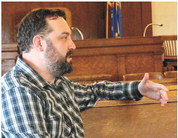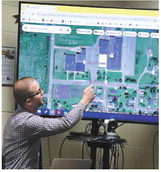Weapons screening coming to courthouse
County employees, board members and other visitors to the courthouse will soon have to go through a security checkpoint for weapons screening before being allowed inside.
At the Oct. 30 county board session, supervisors voted 13-2 to approve a resolution calling for increased security at the courthouse. Supervisors Catherine Lemke and Tim Hansen were opposed and Lisa Carbaugh and Darrell Thompson were absent. Among the changes brought forward by the courthouse security committee is to have an x-ray machine and sheriff’s deputy at the entrance to the courthouse.
All those entering the building would be subject to having their bags checked and be screened for any firearms or other weapons. The move comes after heightened concern over safety of those working in the building.
While the estimated $30,000 expense for an x-ray screening machine will come from the forfeited bond account in the courts, the county as a whole will pick up the additional cost of staffing the door and providing the security.
Sheriff Larry Woebbeking estimated this would cost an additional $85,000 a year in salary and benefits. He told board members that due to some staffing
See COUNTY on page 4 situations in 2025, the sheriff’s department would be able to absorb the increase in the existing budget but that in future years the county would have to increase the budget to pay for the position.
The door would be monitored and screening would take place during the open hours of the courthouse, with it to be determined by county policy in the future how to handle people accessing the courthouse before and after hours. Currently employees are able to use their key fobs to access the courthouse. Under the change entry will only be able to take place through the main entrance by the clerk’s office and employees as well as elected officials will be subject to the weapons screening process.
The weapons screening will require remodeling of the entryway, hiring staff, and purchasing the screening equipment. An implementation date has not been set, but it is not expected to occur until 2025. In addition, there will need to be changes by the sheriff’s department dispatch entrance to limit access through that area.
Judge Ann Knox-Bauer spoke to supervisors highlighting why she felt they should implement tighter security measures for the courthouse.
“The Courthouse is a symbol of government, establishment and authority,” she said, adding that people are compelled to come there through the courts or to do things like paying their taxes. “Emotions are running high. This is what makes the courthouse different than other businesses,” she said.
She gave the example of a civil defamation trial that concluded Tuesday night with the 12-person jury ruling for the plaintiffs and awarding $650,000 in compensatory damages and another $1.75 million in punitive damages. “This is the largest civil verdict in Taylor County history,” she said. She said when they have huge verdict like that, it can cause security issues.
She said there has been a change in her 17 years as being a judge in the court shifting from local offenders who were often generational in nature for families having run ins with the law to having more transient offenders. She explained that many of the people in the court system have issues with impulse control with the concern that people could go out to their vehicle after a ruling and come back with a firearm. She gave examples of this occurring in other places.
While there is a court security officer who is in and around the courtroom as well as panic buttons in offices in the building to alert the sheriffs department, Knox-Bauer said there is currently no monitoring of access in the courthouse as a whole.
“It is unfettered. There is nobody watching them and nobody screening or checking to see who is coming into the courthouse,” she said. She explained that by state supreme court rule, each county has to have a courthouse security committee and a list of best practices was passed down by the courts. “The best practices recommend a single entrance with weapons screening,” she said.
Supervisor Lynn Rosemeyer noted the judge made valid reasons to have increased courthouse security, but questioned how this would impact the employees who work at human services and other departments outside the courthouse. “What are we going to do to protect those 40+ employees?” Rosemeyer asked.
Knox-Bauer said that she didn’t think the county board should determine what should happen at the courthouse based on the other buildings. Supervisor Mike Bub also noted that in the case of Human Services visitor access to the building is already restricted. Woebbeking noted there are additional steps that could be taken there to make them more secure without having a deputy stationed there.
While much of the security and threat data shared by the judge focused on state and national trends, there have been growing concerns in Taylor County. District Attorney Kristi Tlusty said an individual has been charged with making threats against her and her family. She said that while she has been threatened before, it was the threats against her family members that pushed her to have it charged.
County public heath director Michelle Cahoon also gave examples of the numerous threats she and her staff received throughout the COVID-19 pandemic. She said they implemented additional security measures in her office at the courthouse because of these threats including having bullet resistant glass around their reception desk.
Bub cautioned that regardless of the action of the board, there would be little that could be done to stop someone intent on causing harm. “It is very hard to stop a person who wants to do bad things from doing bad things,” he said.
Supervisor Karen Cummings gave the example of working in the courts in Chippewa County with part of her job collecting fines. She said both her and the judge there would get numerous threats. She said the goal is to make it harder for people to do damage. “It is important for employees of Taylor County that they feel safe,” she said.
Supervisor Scott Mildbrand agreed and noted that in addition to the public, county employees would have to go through the screening as a way to prevent workplace violence. However, he questioned if there was a way to shift workload to free up staff or resources for the position.
“We are spread thin” said chief deputy Corey Dassow, noting the screening station would need to be staffed during the business hours at the courthouse.
Woebbeking said that nothing else would change in law enforcement or other areas of courthouse security other than adding someone to screen people for weapons as they enter the building.
Hansen raised the issue of the cost. He noted that every year the county’s budget committee is being told they don’t have any money. He questioned if this would expand from having one additional deputy to having five more to secure all of the buildings.
Woebbeking said it is important to look at statistics about where incidents could occur. “Your biggest exposure is at the courthouse,” he said.
In the end, supervisors voted to move ahead with the plan to have all those entering the courthouse go through weapons screening.
In other business, county board members:
• Approved the 2025 budget including $350,000 in short-term borrowing and set a levy of $14,645,685, which is a 3.5% increase in the levy compared to last year. However, the equalized value for the county increased by about 5.5% which results in a decrease in the tax rate from $6.71 per $1,000 of equalized value to $6.58 per $1,000 of value, a savings of $13 on a home valued at $100,000.
• Approved power line impact fee fund requests for the Roosevelt Rod and Gun Club for $20,000 for the Den’s Acre Campground project, to the Medford VFW post No. 5729 for $40,000 for the new building project, and for the Taylor County Cycling Association for $14,000 for the development of off road bicycle trails in the Campus Wood. Per county policy, funds will be released to the groups when work is underway on the projects.
• Approved a revision to the employee handbook allowing oversight committees to determine which county vehicles will be required to have GPS tracking as well as language taking a firmer stance prohibiting employees from driving while under the influence. Other revisions were for clarification to on-call pay for maintenance employees, premium pay rates for highway department personnel when they do specific tasks, and the addition of a floating holiday for the veterans service department since they have to work on Memorial Day.
• Approved ordinances regarding department authorizations for human services, the ADRC of Taylor County, and register of deeds office. These had previously been approved by multiple committees and are included in the budget.
• Approved the county’s five year strategic plan. During discussion concerns were raised by Bub over some of the wording and it was noted that it is a working document and the committee would continue working on implementations of specific areas over the coming year.
• Approved renewing the contract with Schmiege, Graff and Koch Law Firm to continue serving as the county’s legal counsel for general issues and those related to human services. Changes to the contract include how outside attorneys are paid if there is a conflict as well as compensation for attending necessary conferences and training.




